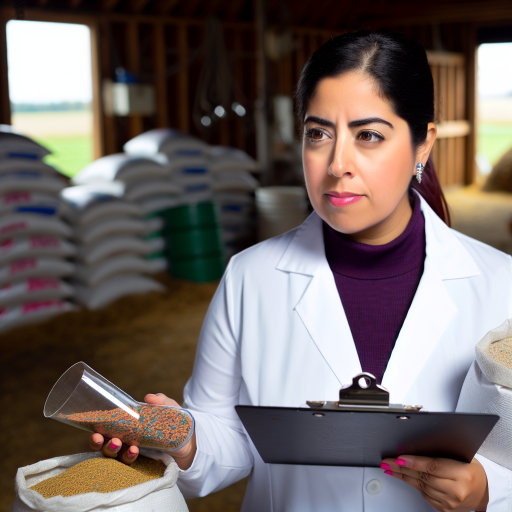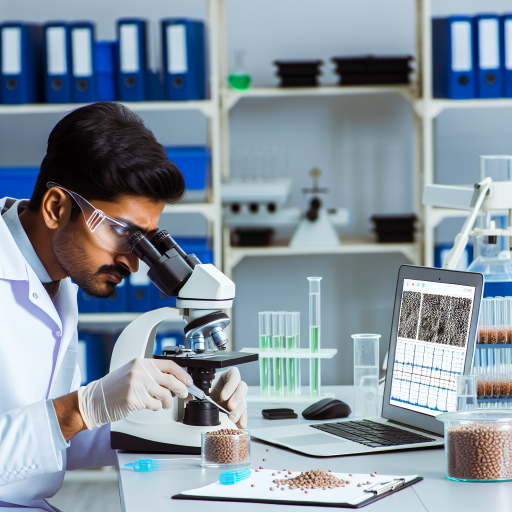Overview of the Role of Seed Technologists
Significance in Agriculture
Seed technologists play a crucial role in agriculture.
Their expertise ensures the availability of high-quality seeds.
Healthy seeds lead to stronger plants and better yields.
Furthermore, they contribute to the overall food supply chain.
Skills and Responsibilities
Seed technologists possess various essential skills.
Analytical skills help them evaluate seed quality effectively.
Attention to detail is vital for accurate testing.
Moreover, they must stay updated on agricultural advances.
Testing and Quality Control
Their primary responsibility includes seed testing.
This testing measures viability, germination, and purity.
Consequently, it guarantees that only the best seeds reach farmers.
Research and Development
Another key area involves research and development.
Seed technologists work on developing new seed varieties.
This innovation addresses the challenges posed by climate change.
Importance for Sustainable Practices
Seed technologists promote sustainable agricultural practices.
They help farmers select seeds that conserve resources.
This approach reduces the need for chemical inputs.
Furthermore, it leads to healthier ecosystems.
Collaboration with Farmers and Industry
Seed technologists collaborate closely with farmers.
They provide guidance on seed selection and planting strategies.
Therefore, successful partnerships enhance productivity.
Additionally, they engage with industry stakeholders.
This collaboration facilitates the sharing of best practices.
Education and Certifications for Seed Technologists
Educational Pathways
Becoming a Seed Technologist starts with choosing the right educational path.
A bachelor’s degree in agricultural sciences is a strong foundation.
Unlock Your Career Potential
Visualize a clear path to success with our tailored Career Consulting service. Personalized insights in just 1-3 days.
Get StartedSpecializations such as plant biology or horticulture enhance knowledge significantly.
Other relevant degrees include a degree in agronomy or plant breeding.
Relevant Programs
Many institutions offer specialized programs for aspiring Seed Technologists.
Look for universities with strong agricultural extension programs.
Online courses are also available and offer flexibility for working professionals.
Consider programs with hands-on lab work and field training opportunities.
Certifications and Additional Training
Certifications can bolster a Seed Technologist’s qualifications significantly.
The Seed Technology Certification Program provides valuable industry recognition.
Additionally, professional organizations often offer workshops and seminars.
Continuing education ensures that professionals stay updated on industry advancements.
Internships and Practical Experience
Gaining real-world experience is critical in this field.
Internships during your studies provide hands-on learning opportunities.
Many universities partner with local farms and seed companies for placements.
Practical experience enhances your resume and builds valuable connections.
Networking and Professional Development
Networking with professionals in the field is essential for career growth.
Join industry associations to meet other Seed Technologists.
Attend conferences to learn about the latest research and techniques.
Online forums and social media platforms can also facilitate networking.
Education and Certifications for Seed Technologists
Overview of Education Requirements
Seed technologists typically need a background in agricultural science.
A degree in plant science, biology, or a related field is essential.
Additionally, practical experience through internships is highly beneficial.
Necessary Certifications
In Canada, specific certifications enhance professional credibility.
The Canadian Seed Institute offers certification programs for seed technologists.
Individuals can obtain the Seed Analyst Certification through this institute.
Licenses and Regulatory Compliance
Licensure requirements vary by province in Canada.
Many provinces require seed technologists to register with local authorities.
Familiarity with the Seeds Act is crucial for compliance.
This legislation governs the production and sale of seeds in Canada.
Continuing Education Opportunities
Continuous education keeps seed technologists up to date with industry trends.
Conferences and workshops provide excellent learning opportunities.
Looking into online courses can also be beneficial.
Organizations like the Seed Science Society offer valuable resources.
You Might Also Like: Impact of Climate Change on Seed Technology Practices
Skills and Competencies Required for Success in Seed Technology
Technical Knowledge
A strong understanding of plant genetics is essential for seed technologists.
Knowledge of seed biology enhances their ability to improve crop varieties.
Additionally, familiarity with industry regulations is crucial for compliance.
Analytical Skills
Seed technologists must possess excellent analytical skills.
They need to analyze data from seed trials and field experiments.
This analysis informs decisions about seed production and marketing.
Problem-Solving Abilities
Strong problem-solving skills are vital in this field.
Seed technologists often face challenges in seed quality and crop yields.
They must devise effective strategies to overcome these obstacles.
Attention to Detail
Attention to detail is key in seed technology.
Even small errors can lead to significant crop failures.
Technologists must carefully monitor all stages of seed production.
Communication Skills
Effective communication is essential in collaborating with teams.
Seed technologists must explain technical information clearly.
They also need to liaise with farmers and industry stakeholders.
Project Management
Seed technologists often manage multiple projects simultaneously.
They must prioritize tasks to meet deadlines effectively.
Strong organizational skills help ensure project success.
Continuous Learning
The seed technology field evolves rapidly with new research.
Technologists must engage in continuous learning to stay updated.
Attending workshops and conferences can enhance their knowledge base.
Uncover the Details: Livestock Nutritionist Job Opportunities In Canada
Continuing Education for Seed Technologists
Importance of Continuous Learning
Continuing education is essential for seed technologists.
This field constantly evolves with new research and techniques.
Ongoing learning helps professionals stay current and competitive.
Relevant Certifications
Several certifications enhance a seed technologist’s credentials.
Organizations like the Association of Official Seed Analysts offer valuable certifications.
The International Seed Testing Association also provides recognized programs.
Participating in these programs boosts professional credibility.
Workshops and Seminars
Workshops are excellent opportunities for hands-on learning.
Industry seminars provide insights into the latest trends and technologies.
Experts share their knowledge during these events, facilitating networking.
Online Courses and Resources
Online platforms offer flexible learning options for seed technologists.
Courses cover diverse topics, including seed quality and testing methods.
Webinars also allow for real-time engagement with instructors.
Professional Organizations and Networking
Joining professional organizations provides valuable resources.
These organizations often offer workshops and networking events.
Networking helps technologists share knowledge and experiences.
Research and Development Opportunities
Involvement in research projects is crucial for professional growth.
Collaborating with universities can lead to innovative solutions.
Research initiatives allow technologists to apply their knowledge practically.
Funding for Continuing Education
Various grants are available to support ongoing education.
Many organizations offer financial assistance for professional development.
Identifying the right funding sources can ease educational expenses.
Find Out More: Networking Opportunities for Seed Technologists in Canada

Professional Associations and Networks for Seed Technologists in Canada
Importance of Professional Associations
Professional associations provide valuable resources for seed technologists.
They offer networking opportunities with industry experts.
Additionally, these associations promote best practices in seed technology.
Canadian Seed Growers’ Association
The Canadian Seed Growers’ Association (CSGA) is a vital organization.
It focuses on promoting high-quality seed production across Canada.
CSGA provides educational programs and certifications for its members.
Members benefit from access to industry updates and research findings.
Seed Canada
Seed Canada is another key player in the Canadian seed industry.
This national organization advocates for seed innovation and sustainability.
Seed Canada connects seed technologists with researchers and policymakers.
Moreover, they host conferences that facilitate knowledge sharing.
Networking Opportunities
Networking opportunities are crucial for professional growth.
Associations often organize workshops and seminars.
These events allow members to share experiences and learn from each other.
Additionally, mentorship programs can help guide new professionals.
Continuous Education and Training
Continuous education is essential in rapidly evolving fields like seed technology.
Many associations offer online courses and certifications.
Staying updated with the latest advancements is vital for success.
Active participation in these educational programs enhances career prospects.
See Related Content: Common Seed Diseases and How Technologists Address Them
Insights into the Current Job Market and Demand for Seed Technologists
Overview of Job Market Trends
The demand for seed technologists is on the rise.
Many agricultural companies are expanding their operations.
This expansion necessitates skilled professionals in seed technology.
Moreover, advancements in biotechnology are reshaping the industry.
As a result, specialized knowledge is increasingly important.
Current Opportunities
Several organizations actively seek seed technologists.
For instance, companies like AgriGenetics and Seed Innovations are hiring.
These positions often promise competitive salaries and benefits.
Additionally, job postings indicate a shortage of qualified candidates.
This gap creates numerous opportunities for job seekers.
Skills and Qualifications Required
Employers frequently list specific skills as essential.
Technical proficiency in seed handling is crucial.
A strong background in plant biology is often necessary.
Furthermore, knowledge of regulations and compliance is valuable.
Analytical skills can greatly enhance a seed technologist’s effectiveness.
Education and Certification Paths
A degree in agricultural sciences is a common requirement.
Many professionals pursue certifications in seed technology.
The American Society of Agronomy offers valuable certification programs.
Such credentials enhance marketability and improve job prospects.
Continuing education opportunities further develop skills over time.
Future Outlook
The future for seed technologists appears bright.
As agricultural technology advances, demand will likely grow.
New research in genetic modification may create additional roles.
Furthermore, global food security pressures will drive job creation.
As a result, professionals in this field can expect a rewarding career.
Future Trends and Advancements in Seed Technology
Emerging Technologies in Seed Production
Advancements in biotechnology are revolutionizing seed production.
Genetic engineering allows for faster development of resilient crops.
Additionally, seed treatments enhance crop protection against pests and diseases.
Moreover, precision agriculture technologies optimize planting and growth conditions.
Increased Emphasis on Sustainability
Sustainability is becoming a key focus in seed technology.
Farmers now require seeds that thrive in environmentally friendly systems.
This shift promotes biodiversity and reduces reliance on chemical inputs.
Furthermore, organic seed varieties are gaining popularity among growers.
Education and Skill Development for Technologists
The changing landscape necessitates new educational programs for seed technologists.
Workshops on biotechnology and data analysis are increasingly vital.
Moreover, certifications focus on sustainable practices and innovative techniques.
This ensures that professionals are equipped to meet future challenges.
Global Collaboration and Research Initiatives
Collaboration between different countries enhances seed technology advancements.
Research initiatives foster shared knowledge and resources.
Partnerships with universities promote innovative approaches and solutions.
Such collaborations also address global food security challenges.
Adapting to Climate Change
Climate change presents significant challenges for seed technology.
Seeds must adapt to varying weather patterns and extreme conditions.
Research focuses on developing climate-resistant seed varieties.
This adaptation requires innovative breeding techniques and technologies.
Implications for Future Education Programs
Education programs must evolve to address these trends.
Curricula should include topics like genetics, sustainability, and precision farming.
Hands-on training will also be essential for practical skill development.
Ultimately, a well-rounded education will prepare technologists for future demands.




